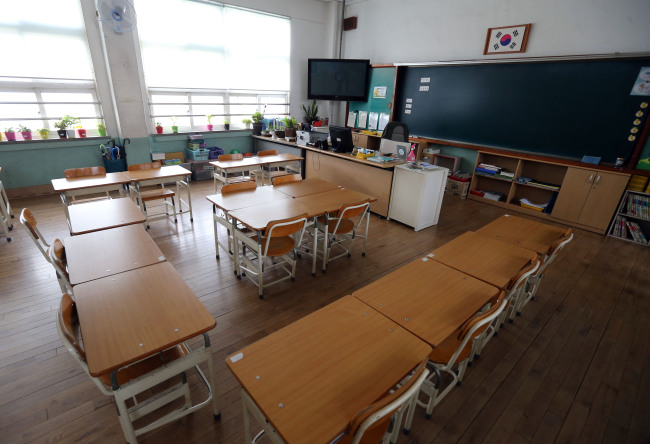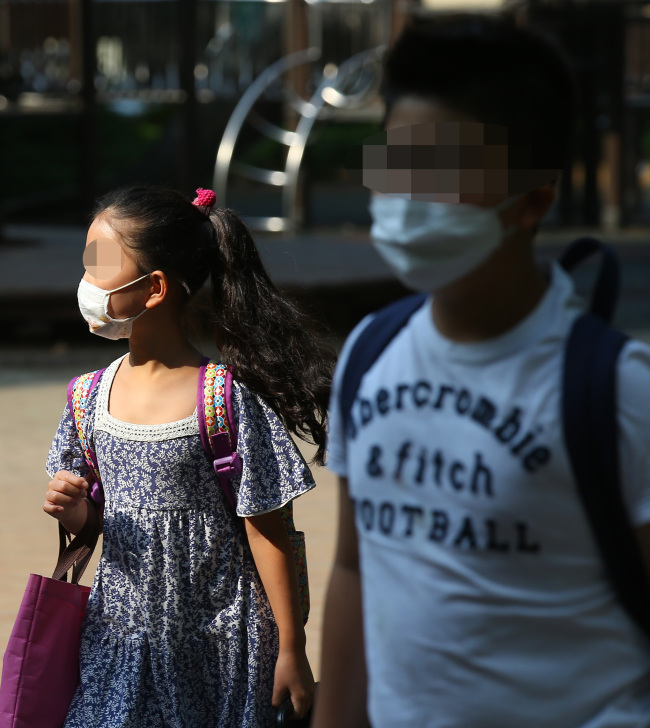Schools reopen after flawed MERS closures
Nationwide school shutdown sparked by lack of trust in government, rumors and concerned parents
By KH디지털2Published : June 15, 2015 - 14:59

Educational institutions across the country resumed classes this week, after fears over the Middle East respiratory syndrome outbreak had suspended operations at nearly 3,000 schools, kindergartens and colleges.
This came as a joint team of officials from the government and the World Health Organization urged schools to reopen, saying last week that the outbreak was not directly related to schools being open.
“Transmission of infection in schools has not been a feature or an important part of transmission of this virus in this outbreak. On the other hand, the closure of many schools creates tremendous hardship for parents and it also creates a level of fear and concern about schools, which does not reflect, in reality, any danger,” said Keiji Fukuda, the WHO’s assistant director-general for health security, in a briefing Saturday.
Ironically, mass anxiety that nearly paralyzed the nation’s educational bodies came to an end after comments made by an outsider, underscoring how little the public places trust in the government’s ability to handle large-scale disasters.
About 68.3 percent of Korean adults answered that they do not trust the government’s countermeasures against MERS in a recent poll by Realmeter. Another survey commissioned by the People’s Solidarity for Participatory Democracy showed that 43.3 percent believed President Park Geun-hye was most responsible for the spread of MERS, followed by Health Minister Moon Hyong-pyo with 30.4 percent.
The distrust had pushed parents to call for classes to be canceled, even before local education offices issued an order for a mass shutdown.
“How am I supposed to trust them (the government)? The same thing happened during the Sewol incident. People in charge said everything was under control, when things were not even close to being okay,” said a 40-year-old woman whose son attends an elementary school in Seoul.
The 2014 April sinking of the Sewol ferry, resulting in over 300 deaths, revealed gaping holes in the government’s safety and crisis management capabilities.
While an outbreak of a contagious disease is very different in nature from a maritime accident, the traumatized parents said they wanted to take no chances in terms of their children’s well-being.
The lack of clear initiative from the educational authorities has further fueled confusion, as neither the Education Ministry nor the educational offices gave clear direction as to how schools should react. On the contrary, the education authorities appeared to be a step behind and lack vital information needed to respond to the situation.
This came as a joint team of officials from the government and the World Health Organization urged schools to reopen, saying last week that the outbreak was not directly related to schools being open.
“Transmission of infection in schools has not been a feature or an important part of transmission of this virus in this outbreak. On the other hand, the closure of many schools creates tremendous hardship for parents and it also creates a level of fear and concern about schools, which does not reflect, in reality, any danger,” said Keiji Fukuda, the WHO’s assistant director-general for health security, in a briefing Saturday.
Ironically, mass anxiety that nearly paralyzed the nation’s educational bodies came to an end after comments made by an outsider, underscoring how little the public places trust in the government’s ability to handle large-scale disasters.
About 68.3 percent of Korean adults answered that they do not trust the government’s countermeasures against MERS in a recent poll by Realmeter. Another survey commissioned by the People’s Solidarity for Participatory Democracy showed that 43.3 percent believed President Park Geun-hye was most responsible for the spread of MERS, followed by Health Minister Moon Hyong-pyo with 30.4 percent.
The distrust had pushed parents to call for classes to be canceled, even before local education offices issued an order for a mass shutdown.
“How am I supposed to trust them (the government)? The same thing happened during the Sewol incident. People in charge said everything was under control, when things were not even close to being okay,” said a 40-year-old woman whose son attends an elementary school in Seoul.
The 2014 April sinking of the Sewol ferry, resulting in over 300 deaths, revealed gaping holes in the government’s safety and crisis management capabilities.
While an outbreak of a contagious disease is very different in nature from a maritime accident, the traumatized parents said they wanted to take no chances in terms of their children’s well-being.
The lack of clear initiative from the educational authorities has further fueled confusion, as neither the Education Ministry nor the educational offices gave clear direction as to how schools should react. On the contrary, the education authorities appeared to be a step behind and lack vital information needed to respond to the situation.

On June 3, the Education Ministry suggested that schools cancel classes if concerned about MERS. But it was a full week later when it finally revealed the criteria for canceling classes. Adding to confusion was the Health Ministry saying canceling classes was unnecessary.
“We were not sure what to do, as the authorities were not telling us for sure. Both the school and the students are getting sick of the nonexistent contingency measures by the government,” said a principal of a school in the Gangnam area who recently canceled classes.
The ministry immediately changing its position and advising schools not to cancel classes following the Korea-WHO team’s announcement appeared to do little to persuade the public that it was on top of things. Two days before, it had ordered schools in the affected region to suspend classes.
Observers also pointed to cautious parents and rumors as having sparked the mass shutdown.
“Whether the authorities advise it or not, I have no plans whatsoever to expose my child to an outside harm,” a 39-year-old mother of two said, adding that she has taken leave from work to take care of her children at home.
Parents of Wangbuk Elementary School located near the MERS-hit Samsung Medical Center repeatedly called school authorities as soon as rumors of the hospital started going around, demanding the classes be canceled immediately. The school suspended classes from June 3 and resumed Monday.
“But I plan not to send my child back to school (from Tuesday) after receiving a text message from the school saying they are sending back children with high fever and that a total of 65 students have not come to school,” said Kim Ji-young, a parent of the school’s student.
The myriad of unconfirmed information circulating via social media also contributed to the panic.
“These messages claimed all sorts; such as a kid who went to a certain private institute had caught the virus, or a doctor living in certain apartment being put in isolation,” said a 43-year-old man whose son attend a school in Gangnam-gu.
“Meanwhile, there was hardly any information worth trusting from the government. Should we stop sending children to private institutions? Should our schools be canceling classes?” he asked.
With the students flocking back to classrooms, the mass panic among schools appears to be settling down. But whether the education authorities can win back the trust of students and their parents remained uncertain.
“What the Education Ministry should have been doing is to spread the correct information. Right now, the school has to learn about the outbreak via different routes (than the government). Even when one has to make a judgement call, one has to rely on inaccurate information,” said Rep. Jeong Jin-hoo of the minor opposition Justice Party on education authorities’ handling of the MERS situation.
By Yoon Min-sik (minsikyoon@heraldcorp.com)







![[Graphic News] More Koreans say they plan long-distance trips this year](http://res.heraldm.com/phpwas/restmb_idxmake.php?idx=644&simg=/content/image/2024/04/17/20240417050828_0.gif&u=)
![[KH Explains] Hyundai's full hybrid edge to pay off amid slow transition to pure EVs](http://res.heraldm.com/phpwas/restmb_idxmake.php?idx=644&simg=/content/image/2024/04/18/20240418050645_0.jpg&u=20240419100350)





![[From the Scene] Monks, Buddhists hail return of remains of Buddhas](http://res.heraldm.com/phpwas/restmb_idxmake.php?idx=652&simg=/content/image/2024/04/19/20240419050617_0.jpg&u=20240419175937)

![[KH Explains] Hyundai's full hybrid edge to pay off amid slow transition to pure EVs](http://res.heraldm.com/phpwas/restmb_idxmake.php?idx=652&simg=/content/image/2024/04/18/20240418050645_0.jpg&u=20240419100350)

![[Today’s K-pop] Illit drops debut single remix](http://res.heraldm.com/phpwas/restmb_idxmake.php?idx=642&simg=/content/image/2024/04/19/20240419050612_0.jpg&u=)